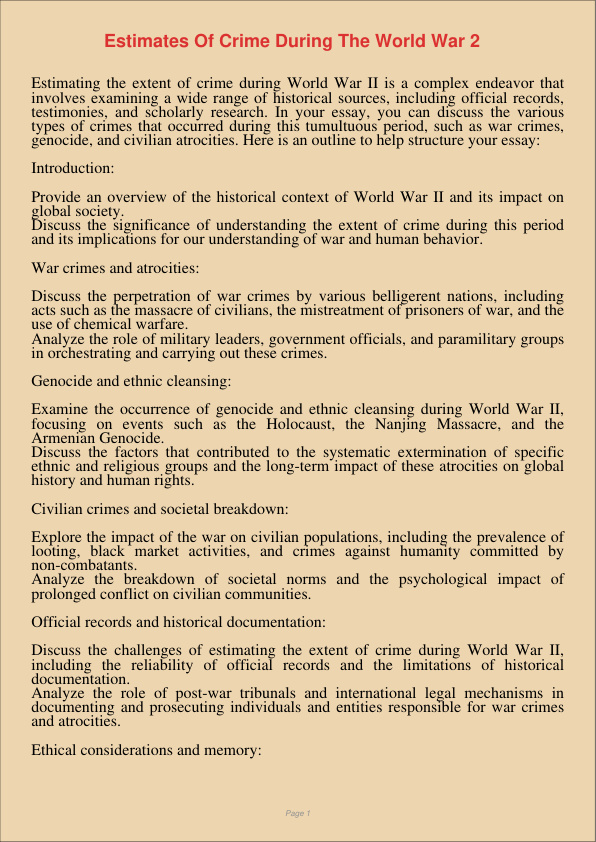Estimates Of Crime During The World War 2
Dec 31, 2023
world war 2
estimates
Geography
Literature
Estimating the extent of crime during World War II is a complex endeavor that involves examining a wide range of historical sources, including official records, testimonies, and scholarly research. In your essay, you can discuss the various types of crimes that occurred during this tumultuous period, such as war crimes, genocide, and civilian atrocities. Here is an outline to help structure your essay:
Introduction:
Provide an overview of the historical context of World War II and its impact on global society. Discuss the significance of understanding the extent of crime during this period and its implications for our understanding of war and human behavior.
War crimes and atrocities:
Discuss the perpetration of war crimes by various belligerent nations, including acts such as the massacre of civilians, the mistreatment of prisoners of war, and the use of chemical warfare. Analyze the role of military leaders, government officials, and paramilitary groups in orchestrating and carrying out these crimes.
Genocide and ethnic cleansing:
Examine the occurrence of genocide and ethnic cleansing during World War II, focusing on events such as the Holocaust, the Nanjing Massacre, and the Armenian Genocide. Discuss the factors that contributed to the systematic extermination of specific ethnic and religious groups and the long-term impact of these atrocities on global history and human rights.
Civilian crimes and societal breakdown:
Explore the impact of the war on civilian populations, including the prevalence of looting, black market activities, and crimes against humanity committed by non-combatants. Analyze the breakdown of societal norms and the psychological impact of prolonged conflict on civilian communities.
Official records and historical documentation:
Discuss the challenges of estimating the extent of crime during World War II, including the reliability of official records and the limitations of historical documentation. Analyze the role of post-war tribunals and international legal mechanisms in documenting and prosecuting individuals and entities responsible for war crimes and atrocities.
Ethical considerations and memory:
Examine the ethical considerations involved in documenting and commemorating the crimes of World War II, including the importance of preserving historical memory and educating future generations. Discuss the role of memorialization and commemorative practices in honoring the victims and survivors of war crimes and atrocities.
Conclusion:
Summarize the key points discussed in the essay. Reflect on the lasting legacy of crime during World War II and its impact on contemporary understandings of conflict, justice, and human rights. Emphasize the importance of learning from the past to prevent the recurrence of similar atrocities and to promote global peace and reconciliation.
Ensure that you support your analysis with relevant historical examples, scholarly sources, and empirical data to provide a comprehensive understanding of the extent and impact of crime during World War II. Additionally, consider the broader implications of wartime crimes on global politics, international law, and human rights discourse.
